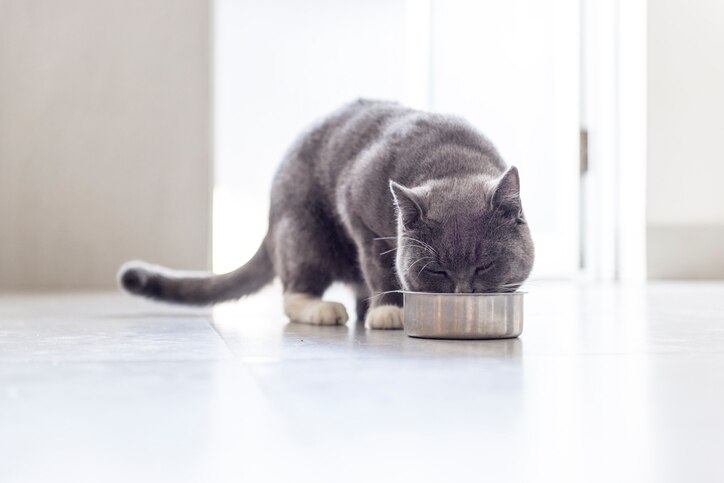Want to help ensure your feline companion is happy and healthy? Pay particular attention to his or her digestive needs.
Your kitty requires nutrient-rich foods (and round-the-clock access to fresh, clean water) to grow and thrive. Read on for some totally claw-some dietary tips and digestive guidelines. We’re paw-sitive this information will come in handy!
What to Feed Your Feline
Cats are carnivores by nature. Their sharp teeth are designed to snatch and shred small prey (our apologies for the visual!), and their digestive systems can easily process large quantities of protein and fat found in meat.
In fact, felines require certain nutrients only found in meat, such as taurine, an amino acid that promotes eye and heart health. Therefore, a vegetarian diet is not ideal for your furbaby.
The best food for your beloved pet is commercial kitten or cat food. The American Society for the Prevention of Cruelty to Animals (ASPCA) recommends purchasing a “high-quality, brand-name” variety.
Most commercial cat foods include all the key nutrients your pet needs, including:
- Protein (helps maintain lean muscle; promotes immunity and a healthy coat)
- Fiber (aids in proper digestion)
- Omega-3 and omega-6 fatty acids
- Vitamins
- Minerals
Ask your veterinarian for a recommendation based on factors including the age, activity level and general health of your cat.
Please note: Because commercial cat foods are designed to offer your feline complete nutrition, supplements aren’t necessary, and in certain cases, may even be harmful.
What About People Food?
Cat trying to purr-suade you to share some “people food”? It’s okay to give in—on occasion. Human foods that are safe for feline consumption include:
- Lean meats, including cooked chicken, beef and turkey
- Canned or cooked fresh fish (steer clear of sushi!)
- Cooked eggs
- Cooked whole grains, including barley, brown rice, corn, couscous, millet, oats and polenta
- Fruits and veggies, such as asparagus, broccoli, cantaloupe and cucumber (keep in mind that these may be a tough sell for your picky feline!)
What Not to Feed Your Feline
Though it may be tempting to share all your favorite foods with your furbaby, some flavorful fare is definitely off limits. The following human foods can be toxic to cats:
- Alcohol
- Bread dough
- Chocolate
- Garlic
- Grapes
- Macadamia nuts
- Onions
- Raisins
- Xylitol (an artificial sweetener common in sugar-free candy and gum)
Common Signs of Digestive Issues in Cats
If your cat’s coat is shiny and he or she seems energetic and produces normal looking stools, chances are, his or her digestive system is functioning properly. However, there are some tell-tale signs that your feline may be experiencing digestive issues. Contact your vet if your pet exhibits any of the following:
- Diarrhea
- Dull coat
- Irregular stools
- Lethargy
- Vomiting
- Weight loss
Ways to Improve Your Feline’s Digestion
If your cat is having digestive issues, your vet may recommend the following treatments:
- An alternate diet containing fewer (or more easily digestible) proteins
- Prebiotics to restore the microbial balance and promote the growth of beneficial bacteria in the gut
- Probiotics to improve stool quality and help prevent diarrhea
If your vet suspects that digest upset is the result of a food allergy, he or she may recommend putting your cat on a special hypoallergenic diet.

